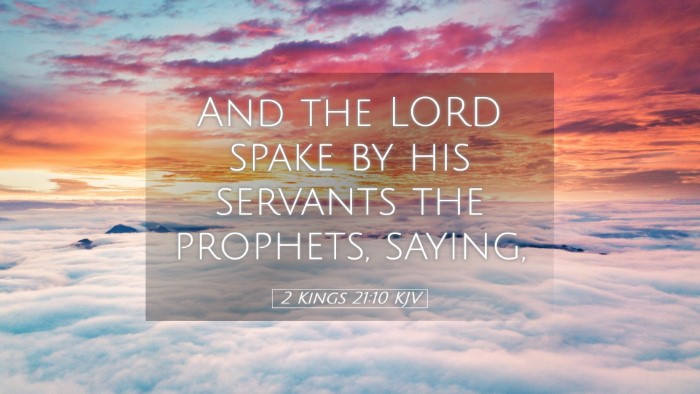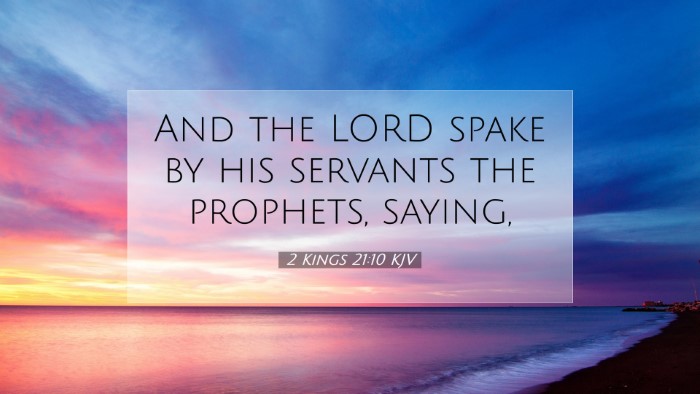Commentary on 2 Kings 21:10
Verse Reference: 2 Kings 21:10 (NKJV) - "And the Lord spoke by His servants the prophets, saying, 'Because Manasseh king of Judah has done these abominations, has acted more wickedly than all the Amorites who were before him, and has also made Judah sin with his idols.'"
Introduction
This verse stands as a critical point in the narrative of Manasseh's reign over Judah. It addresses the profound influence of Manasseh's idolatrous practices and his role in leading the nation of Judah into sin. The declaration of judgment by the Lord, communicated through His prophets, marks a pivotal moment in the historical and spiritual landscape of Israel.
Contextual Background
The historical context of 2 Kings 21 reveals a nation grappling with spiritual decline and moral decay. Manasseh, ascending the throne at a young age, quickly leads Judah astray. The verse encapsulates the prophetic voice of the Lord amid rampant idolatry and injustice, laying the groundwork for understanding how deeply the sin of one leader can affect an entire nation.
Observations from Public Domain Commentaries
Matthew Henry's Commentary
Matthew Henry emphasizes the severity of Manasseh's sins, noting how they were not only numerous but also particularly heinous in the eyes of the Lord. He compares Manasseh’s actions to the notorious sins of the Amorites, highlighting the extent of his corruption. Henry remarks that the prophetic warnings from God reflect divine patience, displaying God’s desire to bring His people back from the brink of destruction.
Albert Barnes' Notes on the Bible
Albert Barnes provides a thorough examination of the implications of Manasseh's wickedness. He points out that Manasseh's actions included child sacrifice and the promotion of pagan worship, which directly violated the covenantal commandments given to Israel. Barnes also notes that Manasseh's reign represents a crucial turning point in Judah's history, leading to eventual judgment and exile, reinforcing the principle that leadership consequences resonate through generations.
Adam Clarke's Commentary
Adam Clarke elaborates on the prophetic message of condemnation rooted in divine justice. He highlights that the Lord's use of His prophets is significant, indicating that God actively engaged with His people. Clarke indicates that the phrase "made Judah sin" illustrates not only the influence of a king but the communal nature of sin and responsibility within a society. This emphasizes the theological concept that leaders bear a significant weight in guiding their people toward righteousness or leading them into sin.
Theological Implications
The judgments pronounced against Manasseh invite important theological discussions about sin, repentance, and divine justice. This passage serves as a reminder of the depth of God’s concern for holiness and the collective consequences of sin. It challenges contemporary readers to consider the impacts of leadership in faith communities and the responsibility of those who influence others.
- Sovereignty of God: The verse highlights God's sovereignty in His ability to communicate judgment through prophets, signifying His rule over nations and their leaders.
- Role of Prophecy: The engagement of prophets illustrates God’s continuous outreach to guide His people, emphasizing the church’s need to heed prophetic voices in its current context.
- Accountability: Manasseh represents leaders who bear a unique responsibility for the moral direction of their people, showing how individual actions can lead to communal guilt.
Practical Applications
For pastors and Christian leaders, the admonitions found in 2 Kings 21:10 serve as a crucial reminder of their influence over congregations and communities. The following practical applications emerge:
- Guarding Against Compromise: Leaders are called to maintain integrity and authenticity in their faith journey to resist societal pressures that lead to moral compromise.
- Promoting Sound Teaching: The need for sound doctrine is paramount, equipping congregations to discern truth from falsehood amidst competing ideologies.
- Encouraging Repentance: Much like the prophetic appeals in the Old Testament, contemporary leaders should foster environments that invite repentance and restoration for their followers.
Conclusion
2 Kings 21:10 serves as a poignant reminder of the ramifications of sin, especially as reflected through the reign of King Manasseh. As we meditate on this passage, may we grasp the weighty responsibility that comes with leadership and the necessity of pursuing righteousness, guided by the insight of Scripture and the voices of faithful prophets. In doing so, we can help steer our communities toward a deeper relationship with God, away from the idolatry that so easily entangles.


